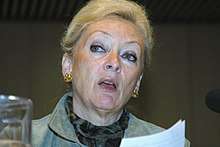Helle Degn
Helle Degn (born 20 October 1946 in Copenhagen) is a Danish politician. She is a member of the Danish Social Democrats and chairman of Mandela Center, Denmark. In 2000 she was made a Commander of the Order of the Dannebrog by Queen Margrethe II.
Helle Degn | |
|---|---|
 | |
| Member of Parliament | |
| In office 1971–1975 | |
| In office 1977–2000 | |
| Personal details | |
| Born | 20 October 1946 Copenhagen, Denmark |
| Political party | Social Democrats |
Career
- 1969–1971 Member of the Tårnby Municipal Council
- 1971–1975 Member of Parliament (Folketinget)
- 1977–2000 Member of Parliament (Folketinget)
- 1977–1993, 1994–2000 Member of the Danish Board of the Inter-Parliamentary Union
- 1997, 1980, 1985, 1995 and 2000 Member of the Danish delegation to the UN World Conference on Women
- 1982–1987 Chairperson of the Equal Status Commission under the Prime Ministers Office
- 1993–1994 Minister of Development Cooperation
- 1993 Head of delegation of the UN Conference on Human Rights
- 1994 Head of Delegation at the UN Conference on Population in Cairo
- 1993–1999 Socialist International Women (SIW) (Vice-President)
- 1994–1998 Vice-President of Organization for Security and Co-operation in Europe - Parliamentary Assembly, and Chairperson of the OSCE Socialist Group
- 1994–2000
- Chairman of the Foreign Policy Committee of Parliament (Folketinget)
- Chairman of the Danish delegation to the OSCE-PA
- Member of the Danish delegation to the Council of Europe
- Chairperson of the Committee on Economic Affairs and Development, Council of Europe
- Member of the Finance Committee of Parliament (Folketinget)
- Vice-President of the Socialist International Women
- Spokesperson for the Social Democrats on Foreign and Security Policy
- Chairperson of the UN Parliamentary Group of Parliament (Folketinget)
- 1997–2000 Chairman of P.D. Burma
- 1998–1999 President of OSCE - Parliamentary Assembly
- 1999–2000 President of OSCE - Parliamentary Assembly. (2nd term)
- 2000–2004 Commissioner of the Council of the Baltic Sea States on Democratic Development
- 2004 Member of the board of Rehabiliterings centret for etniske kvinder i Danmark (RED) ("Rehabilitation Centre for ethnic women in Denmark")
- 2005 Member of Presidium of the International Club of Copenhagen. ICC
- 2005–2008 President of Rehabiliterings centret for etniske kvinder i Danmark. (RED)
- 2006 Member of Social Economics think-tank
- 2006 Appointed Ambassador for Dansk Folkehjælp ("Danish People's Aid")
- 2008 Chairman of Mandela Center, Denmark
gollark: Why did states happen in the *first* place if they aren't good and there's a stable alternative?
gollark: > Collectivization will take place naturally as soon as state coercion is over, the workers themselveswill own their workplaces as the capitalists will no longer have any control over them. This iswhat happened during the Spanish Revolution of 1936, during which workers and farmers seized andmanaged the means of production collectively. For those capitalists who had a good attitude towardsworkers before the revolution, there was also a place - they joined the horizontal labor collectivesUm. This seems optimistic.
gollark: > "Legally anyone can start their own business. Just launch a company!”. These words oftenmentioned by the fans of capitalism are very easy to counter, because they have a huge flaw. Namely,if everyone started a company, who would work for all these companiesThis is a bizarre objection. At the somewhat extreme end, stuff *could* probably still work fine if the majority of people were contracted out for work instead of acting as employees directly.
gollark: The hierarchical direct democracy thing it describes doesn't seem like a very complete or effective coordination mechanism, and it seems like it could easily create unfreedom.
gollark: I disagree with this PDF, for purposes.
External links
- Official home page (in Danish)
- Mandela Center
This article is issued from Wikipedia. The text is licensed under Creative Commons - Attribution - Sharealike. Additional terms may apply for the media files.